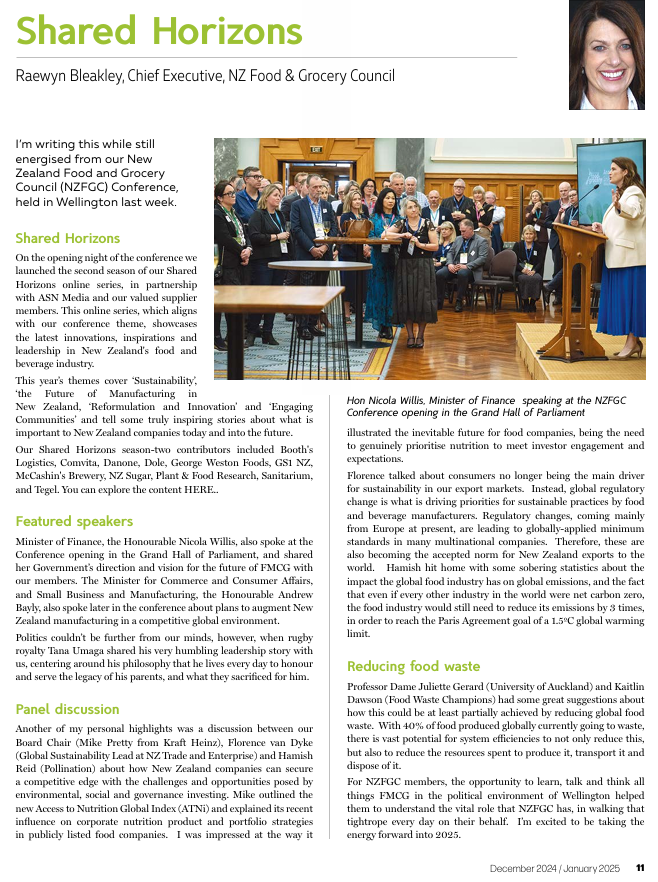Food NZ Column: Shared Horizons
FOODNZ December24/January25 by NZ Institute of Food Science and Technology – Issuu
I’m writing this while still energised from our New Zealand Food and Grocery Council (NZFGC) Conference, held in Wellington last week.
On the opening night of the conference we launched the second season of our Shared Horizons online series, in partnership with ASN Media and our incredible supplier members. This online series, which aligns with our conference theme, showcases the latest innovations, inspirations and leadership in Aotearoa New Zealand’s food and beverage industry.
This year’s themes cover ‘Sustainability’, ‘the Future of Manufacturing in Aotearoa’, ‘Reformulation and Innovation’ and ‘Engaging Communities’ and tell some truly inspiring stories about what is important to New Zealand companies today and into the future.
Our Shared Horizons season two contributors included Booth’s Logistics, Comvita, Danone, Dole, George Weston Foods, GS1 NZ, McCashin’s Brewery, NZ Sugar, Plant & Food Research, Sanitarium, and Tegel. You can explore the content here.
Minister of Finance, the Honourable Nicola Willis also spoke at the conference opening in the Grand Hall of Parliament, and shared her Government’s direction and vision for the future of FMCG with our members. The Minister for Commerce and Consumer Affairs, and Small Business and Manufacturing, the Honourable Andrew Bayly, also spoke later in the conference about plans to augment New Zealand manufacturing in a competitive global environment.
Politics couldn’t be further from our minds, however, when rugby royalty Tana Umaga shared his very humbling leadership story with us, centering around his philosophy that he lives every day to honour and serve the legacy of his parents, and what they sacrificed for him.
Another of my personal highlights was a discussion between our Board Chair (Mike Pretty from Kraft Heinz), Florence van Dyke (Global Sustainability Lead at NZ Trade and Enterprise) and Hamish Reid (Pollination) about how New Zealand companies can secure a competitive edge with the challenges and opportunities posed by environmental, social and governance investing. Mike outlined the new Access to Nutrition Global Index (ATNi) and explained its recent influence on corporate nutrition product and portfolio strategies in publicly listed food companies. I was impressed at the way it illustrated the inevitable future for food companies, being the need to genuinely prioritise nutrition to meet investor engagement and expectations.
Florence talked about consumers no longer being the main driver for sustainability in our export markets. Instead, global regulatory change is what is driving priorities for sustainable practices by food and beverage manufacturers. Regulatory changes, coming mainly from Europe at present, are leading to globally applied minimum standards in many multinational companies. Therefore, these are also becoming the accepted norm for New Zealand exports to the world. Hamish hit home with some sobering statistics about the impact the global food industry has on global emissions, and the fact that even if every other industry in the world were net carbon zero, the food industry would still need to reduce its emissions by 3 times, in order to reach the Paris Agreement goal of a 1.5 degree global warming limit.
Professor Dame Juliette Gerard (University of Auckland) and Kaitlin Dawson (Food Waste Champions) had some great suggestions about how this could be at least partially achieved by reducing global food waste. With 40% of food produced globally currently going to waste, there is vast potential for system efficiencies to not only bring this down, but also to reduce the resources spent to produce it, transport it and dispose of it.
For NZFGC members, the opportunity to learn, talk and think all things FMCG in the political environment of Wellington helped them to understand the vital role that NZFGC has, in walking that tightrope every day on their behalf. I’m excited to be taking the energy forward into 2025.

